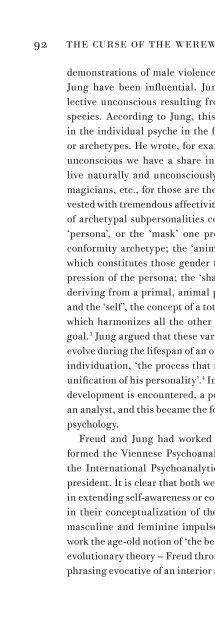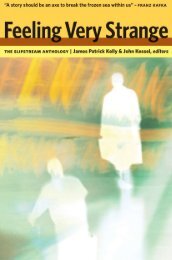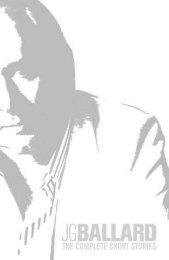The Curse of the Wer.. - Site de Thomas - Free
The Curse of the Wer.. - Site de Thomas - Free
The Curse of the Wer.. - Site de Thomas - Free
You also want an ePaper? Increase the reach of your titles
YUMPU automatically turns print PDFs into web optimized ePapers that Google loves.
92 THE CURSE OF THE WEREWOLF<br />
<strong>de</strong>monstrations <strong>of</strong> male violence. In such contexts, <strong>the</strong> i<strong>de</strong>as <strong>of</strong> Carl<br />
Jung have been influential. Jung proposed <strong>the</strong> existence <strong>of</strong> a collective<br />
unconscious resulting from <strong>the</strong> long evolution <strong>of</strong> <strong>the</strong> human<br />
species. According to Jung, this psychological heritage is expressed<br />
in <strong>the</strong> individual psyche in <strong>the</strong> form <strong>of</strong> universal primordial images,<br />
or archetypes. He wrote, for example, that ‘[i]n so far as through our<br />
unconscious we have a share in <strong>the</strong> historical collective psyche, we<br />
live naturally and unconsciously in a world <strong>of</strong> werewolves, <strong>de</strong>mons,<br />
magicians, etc., for those are <strong>the</strong> things which all previous ages have<br />
vested with tremendous affectivity.’ 2 Jung also suggested that a number<br />
<strong>of</strong> archetypal subpersonalities constituted <strong>the</strong> individual psyche: <strong>the</strong><br />
‘persona’, or <strong>the</strong> ‘mask’ one presents to <strong>the</strong> world, also called <strong>the</strong><br />
conformity archetype; <strong>the</strong> ‘anima’ (in men) or ‘animus’ (in women),<br />
which constitutes those gen<strong>de</strong>r traits which are repressed in <strong>the</strong> expression<br />
<strong>of</strong> <strong>the</strong> persona; <strong>the</strong> ‘shadow’, a <strong>de</strong>eply instinctive archetype<br />
<strong>de</strong>riving from a primal, animal past, also suppressed by <strong>the</strong> persona;<br />
and <strong>the</strong> ‘self’, <strong>the</strong> concept <strong>of</strong> a total, unified, entirely conscious psyche<br />
which harmonizes all <strong>the</strong> o<strong>the</strong>r archetypes, and represents <strong>the</strong> life’s<br />
goal. 3 Jung argued that <strong>the</strong>se various components <strong>of</strong> <strong>the</strong> psyche would<br />
evolve during <strong>the</strong> lifespan <strong>of</strong> an ordinary individual, an effect he called<br />
individuation, ‘<strong>the</strong> process that normally leads a human being to <strong>the</strong><br />
unification <strong>of</strong> his personality’. 4 In Jung’s view, when an obstacle to this<br />
<strong>de</strong>velopment is encountered, a person might require <strong>the</strong> assistance <strong>of</strong><br />
an analyst, and this became <strong>the</strong> foundation <strong>of</strong> his technique <strong>of</strong> analytic<br />
psychology.<br />
Freud and Jung had worked toge<strong>the</strong>r closely from 1907, having<br />
formed <strong>the</strong> Viennese Psychoanalytic Society in 1908, which became<br />
<strong>the</strong> International Psychoanalytic Association in 1910, with Jung as<br />
presi<strong>de</strong>nt. It is clear that both were interested in <strong>the</strong> unconscious, and<br />
in extending self-awareness or consciousness. <strong>The</strong>y were also in accord<br />
in <strong>the</strong>ir conceptualization <strong>of</strong> <strong>the</strong> human psyche as a combination <strong>of</strong><br />
masculine and feminine impulses, and both incorporated into <strong>the</strong>ir<br />
work <strong>the</strong> age-old notion <strong>of</strong> ‘<strong>the</strong> beast within’, mo<strong>de</strong>rnized with a dash <strong>of</strong><br />
evolutionary <strong>the</strong>ory — Freud through <strong>the</strong> consistent use <strong>of</strong> imagery and<br />
phrasing evocative <strong>of</strong> an interior animality, Jung through <strong>the</strong> <strong>the</strong>oriza-





